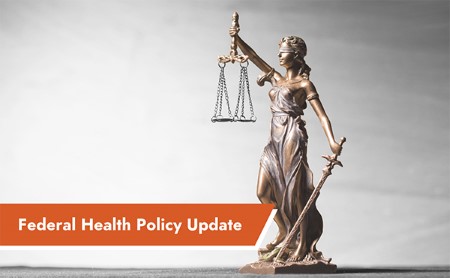Midterm Elections: Predictions on Congressional Priorities for Upcoming Session
October 13, 2022 | Jeffrey Ekoma
 2022 is rapidly coming to an end, which also means we are getting closer and closer to events and activities that many of us look forward to each year. And no, I am not referring to the change in weather (which I love) or the upcoming fall holiday celebrations (which I also love), but rather the 2022 midterm elections! Below are some predictions on priorities Congress may seek to address when it kicks off its 118th session on Jan. 3, 2023.
2022 is rapidly coming to an end, which also means we are getting closer and closer to events and activities that many of us look forward to each year. And no, I am not referring to the change in weather (which I love) or the upcoming fall holiday celebrations (which I also love), but rather the 2022 midterm elections! Below are some predictions on priorities Congress may seek to address when it kicks off its 118th session on Jan. 3, 2023.
Healthy Future Task Force
House Minority Leader Kevin McCarthy (R-CA) created the Healthy Future Task Force to modernize our healthcare system, develop better cures and treatments, and promote overall health and well-being—just to name a few.
The task force is composed of various subcommittees, ranging from modernization and treatment to affordability and security. Each subcommittee was charged with producing solutions to problems facing our healthcare system that will serve as a blueprint for Republicans if they can secure a majority in the House of Representatives after the midterm elections. Some of the solutions offered by the various subcommittees include maintaining access to telehealth services, using the private sector to help address public health preparedness, expanding healthcare options for patients, and conducting oversight on all things related to COVID-19.
Oversight, Oversight, and More Oversight
The overall response to the COVID-19 pandemic was—in a word—massive. Six emergency supplemental appropriation bills provided approximately $484 billion to support critical work happening across public health. These six bills also contained requirements for agencies like the Government Accountability Office to conduct nonpartisan monitoring and oversight related to both the pandemic and funding provided as part of the response.
Concurrently, Republican members of Congress have expressed their interest in oversight-related activities. Notably, soon-to-be-retired Senator Richard Burr (R-NC), along with other members of the Senate Health Education, Labor, and Pensions Committee, have called for accountability surrounding COVID-19 supplemental funds, including unspent funds and funds that were used for activities such as vaccine awareness. Other members have hinted at their interest in learning more about the origins of COVID-19 and auditing public health agencies on their responses to the pandemic.
In addition to oversight, there have been mixed thoughts on CDC’s potential restructuring. For example, the ranking member of the House Committee on Energy and Commerce, Cathy McMorris Rogers (R-WA), seems interested in authorizing the scope and mission of CDC as determined by Congress, while Senator Mitt Romney (R-UT) proposed a “new entity” to improve access to public health data.
Opioid Crisis
According to CDC, more than 107,000 people died from a drug overdose in 2021, and members on both sides of the aisle continue to express concern about the epidemic and its impact on their communities. Most recently, in a hearing with federal public health officials, several senators voiced their concerns with opioid prescription practices and with relabeling opioids currently on the market. This issue is also a hot topic in several congressional races across the country, and will likely be top-of-mind when Congress returns to Washington, D.C.
Reproductive Health
Reproductive health is on the ballot in many states and it’s a priority for many who are either running for re-election or seeking a congressional seat. Members of both parties have expressed protecting access to reproductive services and/or codifying the most recent Supreme Court ruling.
Did Someone Say Debt Ceiling and Sequestration?
It’s fair to wonder why the debt ceiling may be an issue, considering that it was just raised last year to more than $31 trillion. However, our overall national debt just surpassed $31 trillion and it is expected that the ceiling may likely need to be raised again in the summer of next year or as early as the spring with some estimates. As always, discussions about the debt ceiling vary across the Capitol, and it’s impossible to mention the debt ceiling without also bringing up sequestration and the possibility of its return.
As a friendly reminder, the Budget Control Act of 2011 created the Joint Select Committee on Deficit Reduction, or supercommittee, which was charged with finding a solution to reducing the federal deficit. However, the supercommittee was unable to meet its charge and a budgetary mechanism called sequestration kicked in, which imposed limits on annual appropriations through 2021.
While Congress took occasional steps to mitigate sequestration cuts during that period, they proved harmful to critical public health programs over time. Fast forwarding, some members would prefer for the federal budget to be balanced and for additional rules to be in place related to fiscal accountability. Others have sought to reform the budget process altogether. Therefore, it's hard to rule out the return of sequestration or other fiscal measures that members may employ to reach these goals.
As is always the case with a new session of Congress, there is a unique window to further highlight the importance of public health. Furthermore, a new session provides the opportunity for state and territorial health officials to strengthen, rebuild, and develop relationships with members of Congress and their staff on public health priorities impacting their communities. ASTHO looks forward to supporting those efforts as we all continue our work to advance the public’s health and well-being.